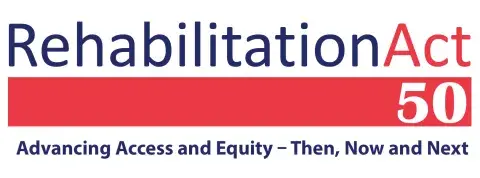
On September 26, 2023, the Department of Homeland Security (DHS) joins the Nation in celebrating the milestone 50th anniversary of the Rehabilitation Act of 1973 (Rehabilitation Act) — the landmark civil rights law prohibiting disability discrimination in the activities of the federal government. The passing of this historic civil rights legislation laid the groundwork for advancing equity, access, and inclusion for people with disabilities in programs conducted by federal agencies, programs receiving federal financial assistance, in federal employment, and in employment practices of federal contractors. The Rehabilitation Act sets the foundation for the Americans with Disabilities Act (ADA) of 1990 and the ADA Amendments Act of 2008, which prohibit disability discrimination beyond the federal government, guaranteeing individuals with disabilities equal opportunity and full participation in many areas of everyday life.
At DHS, we are committed to ensuring nondiscrimination and equal opportunity for individuals with disabilities in all of our programs and activities. From building a diverse and inclusive workforce through our hiring practices, to eliminating barriers to DHS services and programs, we are dedicated to improving access, equity, inclusion, and equal opportunity by upholding the principles of the Rehabilitation Act. On this golden anniversary, DHS is pleased to announce that we are completing work on the first-ever DHS regulation ensuring nondiscrimination for individuals with disabilities served or encountered by recipients of DHS funding. We anticipate this proposed regulation will be available for public comment early next year. DHS will also soon release an updated Guide to Interacting with People who have Disabilities, which was developed to assist DHS personnel, contractors, and grantees in their interactions with people with disabilities.
Disability Equity and Access at DHS
Section 501 of the Rehabilitation Act prohibits federal agencies from discriminating against qualified individuals with disabilities in hiring and employment practices. It requires agencies to take affirmative action in the hiring, placing, and advancing of individuals with disabilities. DHS is committed to being a model employer for individuals with disabilities and has set employment goals focused on recruiting, hiring, retaining, and advancing employees with disabilities. These goals include using the Schedule A hiring authority and providing reasonable accommodations and personal assistive services to employees with disabilities.
Section 504 of the Rehabilitation Act prohibits disability discrimination in federally-conducted and federally-funded programs and activities. DHS Directive 065-01 establishes the policy and mechanisms for ensuring nondiscrimination for individuals with disabilities served or encountered by DHS. Under this Directive, DHS Components complete self-evaluations by reviewing their facilities, programs, policies, and practices to ensure program accessibility, physical access, effective communication, and reasonable modification procedures are in place. DHS has recently released a report highlighting the Department’s achievements in disability access under the Directive.
Section 504 also covers people with disabilities who are served by DHS grantees and other recipients of DHS financial assistance, such as state, local, and territorial government recipients, among other recipients. DHS has provided training to hundreds of recipients on the requirement for disability-related policies and procedures including reasonable modification and complaint procedures for members of the public. DHS grant recipients can contact DHS for training or technical assistance at crcl@hq.dhs.gov.
Section 508 of the Rehabilitation Act establishes requirements for electronic and information technology developed, maintained, procured, or used by the federal government. Section 508 requires electronic and information technology to be accessible to people with disabilities, including employees and members of the public. The DHS Accessibility & Usability Program (AU) guides and supports all DHS Components in removing barriers to information technology. AU strives to ensure that information and communications technology procured, developed, maintained, or used by DHS is accessible to its employees and customers with disabilities through a range of policy, training, technical assistance, governance, and compliance activities.
As we reflect on the Rehabilitation Act over the last 50 years, DHS acknowledges the need for continued progress to fully bring about the intent of this landmark legislation – equal access and inclusion for all individuals with disabilities. You can learn more about the Department’s continued efforts to advance and provide equal opportunity and full inclusion for individuals with disabilities by visiting our Disability Access webpage.
